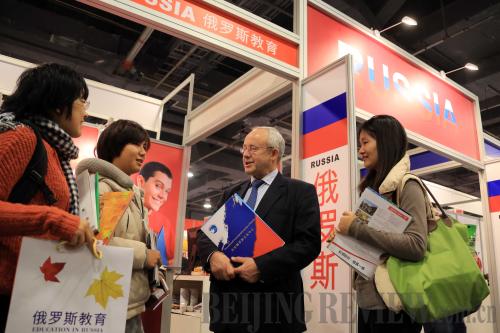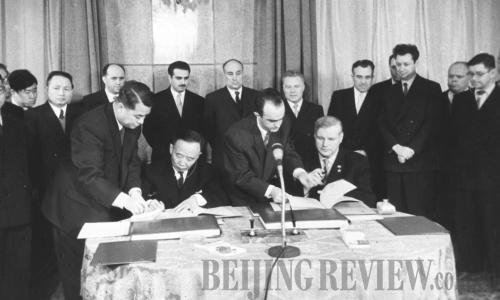|
 |
|
NEXT GENERATION: A Russian education official answers questions from Chinese students during an international education show in Beijing on November 2, 2013 (ZHANG YANHUI) |
Internal impetus
Currently there is a view that Washington is the major cause for Moscow and Beijing's close embrace; if Washington changes its stance, contradictions between Beijing and Moscow will emerge. But this viewpoint has underestimated the role that an internal impetus for cooperation has played for the two countries in deepening their relations. It is common interests that have driven them closer while external factors have merely accelerated the process.
Both countries learnt lessons from the China-Soviet confrontation in the 1960s-80s, which greatly hindered economic development and threatened national security for both nations.
As large emerging economies, China and Russia are complementary to one another. Russia is a big exporter of energy, while China is a major buyer. Russia faces labor shortages and its light industry is congenitally deficient. Meanwhile China is known as the world's factory. Russia has advantages in aerospace and nuclear energy sectors, while China has advantages in areas such as high-speed railway technology and telecommunications.
As both China and Russia undergo a social and economic transition, they are confronted with similar challenges. Russia must change its resource-based economic development mode, and China also faces the task of sustainable economic transformation and industrial upgrading. While both countries need to deepen economic restructuring, they are also expected to maintain social stability. The two sides need to support each other on these prominent issues.
China and Russia have common aspirations for the democratization of international politics. Both countries are opposed to unilateral actions that push the UN aside. They call for inclusiveness of all civilizations and oppose forced regime changes or altering the institutions of other countries recklessly. They are opposed to attempts to rewrite the history of World War II. All these are both for their interests and the well-being of most international community members. However, China and Russia will not form an alliance as it would possibly lead to new bloc confrontations, bringing more risk of conflicts.
The internal impetuses that galvanize China-Russia ties will exist for a long time. Therefore, even without the U.S. factor, their cooperation will not slow down. And experience has shown that even as Washington raised the concept of "G2" or moved to ease Russian-U.S. relations, China-Russia relations had not been affected.
 |
|
DAYS OF OLD: China and the Soviet Union sign a science and technology cooperation protocol in Moscow on January 18, 1958 (XINHUA) |
Increasing mutual trust
China-Russia relations have developed rapidly and smoothly over the past decades, but it doesn't mean there are no differences between the two. Actually, Russia worries China will exert more influence in the former Soviet Union nations as it attaches importance to sphere of influence. Russia fears becoming a raw material appendage of China as well as Chinese immigrants. In addition, Russia still needs time to adjust to a more powerful China. As time goes on, Russia is gradually desalting its concerns and becoming more reassured in the current bilateral relationship.
Russia is a unique power. At the moment, Russia is one of the targets of the United States' containment policy on a global scale. While the United States is an established power, Russia is regarded as a challenger. But within the sphere of the Commonwealth of the Independent States (CIS) that groups former Soviet Union nations, Russia sees other CIS members as its "backyard." In this sense, Russia is an established power trying to defend its sphere of influence. The Ukrainian crisis reflects the mindset of Russia. Russia is on the alert for any countries that might compete with it in the region. With the increasing cooperation between China and CIS countries, "China-Russia competition" has surfaced increasingly in the Russian media. Putin also addressed the issue during his presidential campaign.
However, Russia has gradually been aware that most CIS countries pursue multilateral diplomacy and seek independent political, economic and security policies. It has also realized that China, though seen as a "challenger," respects Russia's traditional influence in the region. Actually, the interests of the two countries are compatible. China is a reliable partner of Russia that can help it stabilize the regional situation. During Xi's Central Asia trip in September 2013, he made very clear that China will never interfere in the internal affairs of Central Asian countries, nor seek dominance or build a sphere of influence in the region.
Regarding economic cooperation, both China and Russia have a strong wish to strengthen mutually beneficial cooperation and raise their quality and level. Russian people are increasingly aware that without China, the major buyer of Russian resources, Russia might suffer from much slower economic growth. Russians are also gradually changing their attitudes toward Chinese immigrants in Russia's Far East region.
A recent survey by Russia's Public Opinion Foundation shows that 57 percent of Russian people believe that a powerful China is not a threat to Russia while 19 percent believes it is. As recently as 2009, about 44 percent of Russian people considered China a threat. The new survey shows about 74 percent of Russian people believe China and Russia are friendly partners while just 9 percent disagree.
The author is deputy director of the Department for European-Central Asian Studies under the China Institute of International Studies
Email us at: yaobin@bjreview.com
| 